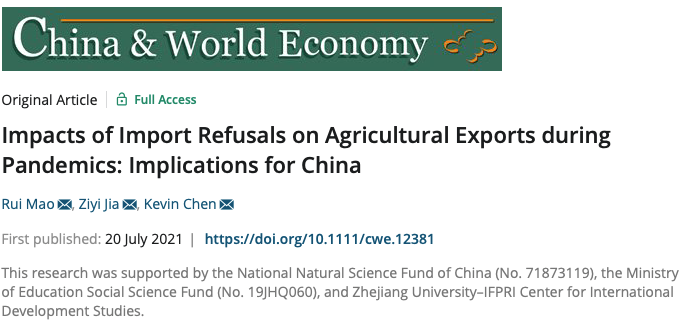7月21日,IFPRI资深研究员、浙江大学求是讲席教授陈志钢与浙江大学中国农村发展研究院茅锐教授及贾梓祎博士在经济学领域知名国际期刊《China & World Economy》发表论文,揭示疫情对农产品贸易的影响。文章题为“疫情冲击下进口管制措施对农产品出口的影响:对中国的启示(Impacts of import refusals on agricultural exports during pandemics: Implications for China)”。

文章简介
过去20年间,全球经历了数次重大传染病疫情,传染病疫情对农产品国际贸易的经济影响逐渐受到学者的关注。除了劳动力短缺、生产停滞、消费疲软等直接渠道,传染病疫情是否会通过增加农产品贸易壁垒的间接途径影响农产品国际贸易?本文提出了一个理念性框架,认为当国内消费者对进口食品安全存在较大担忧时,监管当局可能绕过世卫和世贸组织的原则,采取针对疫情国农产品的单边进口限制措施。文章搜集整理了近二十年来急性呼吸系统综合征、甲型流感、埃博拉病毒和新型冠状肺炎四次主要非食源性传染病疫情期间的月度确诊病例数据,以及FDA的进口拒绝裁定数据,对此提供了经验证据。文章的主要贡献是:揭示了疫情暴发不仅可能对国际贸易产生直接冲击,而且会通过引发进口伙伴的贸易壁垒进一步抑制疫情国的农产品出口,从而凸显了关注贸易壁垒变化并在多边主义框架下协调各国贸易管制措施的重要性。
文章摘要
Pandemic outbreaks disrupt agricultural trade. The possible strengthening of import barriers to products from countries at the epicenter of a pandemic by their trade partners could aggravate this situation. This paper examines the responses of the US Food and Drug Administration (FDA), import refusals, and subsequent trade impacts on the agricultural exports from the developing countries that were the epicenters of four pandemics in the past two decades. Using monthly data for the period 2002–2020, we find increased import refusals and amplified trade-impeding impacts on agricultural exports during pandemic outbreaks. Increased import refusals and the amplification of the trade-impeding effect of import refusals were especially large when China was the epicenter. We further examine possible differences in these results across products and FDA inspection methods, and the main conclusions remain robust. This paper offers a better understanding of the economic outcomes of pandemic outbreaks and provides policy suggestions for China.
文章来源:
